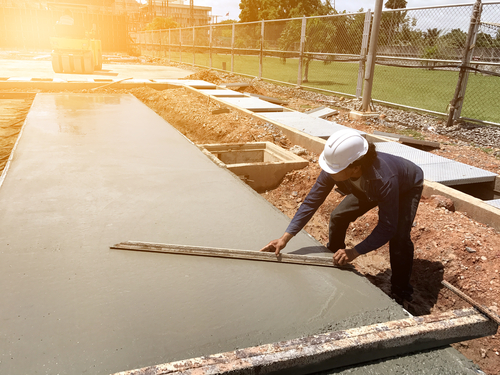Best concreters near you
Top concreters near you
Browse the best concreters and compare ratings and reviews.
Hire the best concreter specialist
Search Uptasker for the best concreter specialists
How can a concreter be of help to me?
There is a wide variety of materials available to suit different new building or renovation projects, whether large or small construction operations. In terms of sheer strength, there is no doubt that concrete is one of the best choices when it comes to structures such as tunnels, road or parking surfaces, bridges and retaining walls, stairways and other surfaces which will have to take a great deal of heavy traffic or physical abuse. A concreter would be the specialist to contact for any of these building operations, as well as smaller projects, including the manufacture, supply and laying of uniquely designed pavers in a range of colours on pathways, driveways and patios, laying a concrete floor under and around a backyard clothes line, building a concrete braai or specifically designed seating area, manufacturing unique indoor concrete work surfaces in kitchens or bathrooms, grinding of old concrete to remove damaged coatings or sealers prior to re-sealing, and a host of other projects.
What do concreters do?
Concreters are specialists in their trade. They are responsible for pouring, leveling, shaping and sometimes tinting concrete in situ, amongst other responsibilities. If the project requires large amounts of concrete, this is often mixed at the pre-mix concrete suppliers’ factory and then delivered to the site in a pre-mix concrete truck, but for smaller jobs, a concreter will mix the cement, gravel or sand, concrete and water at the site as required. Concreters may also be tasked with cutting joints and apertures in hardened concrete using specialized equipment. Concrete is usually poured when in small quantities, onto or into the area to be concreted, or pumped from the concrete truck itself. For obvious safety reasons, concreters who mix the concrete themselves have to be knowledgeable and skilled on the specific mix required for the purpose intended. When laying large areas which are prone to expansion and shrinkage in different weather conditions, concreters are skilled in ensuring that the area has sufficient expansion joints cut into the concrete to avoid cracking and breaking up. Concreters are responsible for ensuring that all concrete surfaces are smooth and sleek and for sealing these surfaces properly since concrete is porous and prone to staining when not properly sealed.
Concrete applications
Concrete has so many different applications across both the private, industrial and commercial sectors. Many parking garages are laid to concrete for durability, together with the pillars which support the structure. Bridges and tunnels are built with concrete, with steel rod inner supports for added strength and weight-bearing capabilities.
Concrete, besides being strong, heavy and dense, is also moldable when wet, thus making it the ideal medium for shaping in specific or awkward areas, and lends itself well to the manufacture of repetitive uniform shapes which are pre-cast in either temporary wood or steel formwork moulds which can be re-used repeatedly and can be formed into many different shapes. The low safety walls which line many of our major highways are composed of concrete which has been molded into specific shapes and then laid end to end as a boundary, often with neon strips which glow during darkness as a guide to the motorist. Boundary walls are sometimes built from concrete slabs which have been pre-cast in a factory and then transported to their final destination for assembly.
Other applications for pre-formed concrete are block paving in a variety of designs, railway sleepers, masts, poles, culverts and pipes. Concrete may also be applied in construction through a hose which pneumatically projects the concrete at high velocity onto a surface which is usually reinforced by steel rods. This is known variously as shotcrete, gunite or sprayed concrete, and was first introduced in 1914, so is certainly not a new innovation. It has definite advantages over traditional methods, such as additional sustainability and durability, environmental responsibility through reduced quantities of concrete material required, efficiency, ease of use in difficult or complex free form shapes where time-consuming and complicated formwork moulds would otherwise be required, and enhanced strength properties. Shotcrete may be used for a range of applications, including water reservoirs, sea walls and pools, piers, skate parks, tunnels, canals, retaining walls, and other applications such as during concrete repair operations, construction and repair of silos, structural concrete and lateral support builds.
How to find the right concreter for your needs
Check their online ratings and customer reviews
Concreters, although providing a valuable and much needed contribution to the construction and building industry as a whole, are not all that easily found through internet searches, although they are certainly making increasing use of this method of advertising. Internet search sites like Uptasker definitely assist in this regard, listing in specific geographical areas, providing online ratings and customer reviews, and allowing one-click links to listed websites, if available. Concreters may also be found through house and home magazines and brochures, home expos, flyers, newspaper ads and the Yellow Pages, and by enquiries through construction companies and builders who deal with these specialists all the time.
Top concreter tips

Whilst concrete is an essential part of any large building operation from the flooring upwards, and mostly goes relatively unnoticed, it can form statement accents or features in your home and business in so many different ways. If you plan on using concrete in any way, be sure to find the best concreter for the job to ensure you get the results which will add both value and beauty to the area for many years. For more tips, see our concreter articles.
Read Concreting articles
More concreters near you
Browse more concreters and compare ratings and reviews.